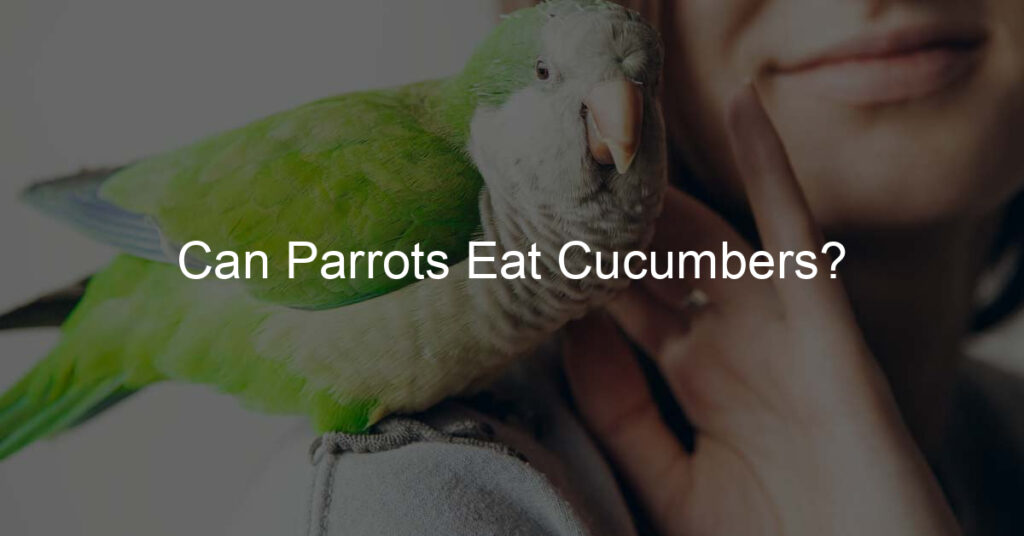Yes, parrots can eat cucumbers. Cucumbers are a great source of nutrition for parrots, and in some cases, they may even prefer cucumber to other vegetables.
Cucumbers are low in calories but high in dietary fiber, vitamin K, and potassium which makes them an ideal snack for birds. The peel of the cucumber is also a great source of vitamins, minerals, and antioxidants that can help support your bird’s overall health.
When feeding your parrot cucumbers, it’s best to take off the peel as this part contains higher concentrations of pesticides.
Additionally, some parrots may not like the texture or taste of cucumber peels, so it’s always best to remove those before preparing their food. You can also choose to cut the cucumber into smaller pieces or strips for easier consumption and digestion.
Cucumbers can be served raw or cooked, depending on your parrot’s preference; however, it is essential to note that certain cooking processes can cause nutrient loss which may not be beneficial for your bird.
Furthermore, you should avoid adding sugar or salt as these substances have no nutritional value and may cause health issues in birds if consumed regularly.
Providing your parrot with fresh, organic cucumbers is a great way to supplement their diet with essential vitamins and minerals while giving variety at mealtime.
Cucumbers are a safe vegetable for most parrots, but you should always seek advice from your vet before introducing any new foods into their diet just to be sure they do not pose any potential health risks.
What Are the Side Effects of Cucumbers on Parrots?
The side effects of cucumbers on parrots have yet to be fully understood. While it is generally recognized that cucumbers are safe for parrots to eat, there have been reports of some birds developing digestive issues after consuming too much of this vegetable.
Eating large amounts of cucumber can cause a bird’s stomach to swell and be uncomfortable as the seeds may become lodged in the digestive tract. Therefore, it is recommended that cucumbers should only be fed in moderation and that they should be well-washed before feeding them to your pet.
Furthermore, while cucumbers contain beneficial vitamins and minerals like Vitamin A, iron, magnesium, and dietary fiber, they also contain oxalic acid, which can be toxic in large quantities. Hence, it is important to feed this vegetable sparingly.
What Vegetables Are Toxic to Parrots?
In addition to cucumbers, several other vegetables can be toxic if consumed by parrots.
These include garlic, onions, chives, and leeks.
All of these vegetables contain a compound called thiosulfate which can be fatal for parrots in sufficient quantities. Likewise, rhubarb leaves should also be avoided as they may have high levels of oxalic acid, which can cause kidney damage in birds.
It is important to remember that even small amounts of these vegetables can be poisonous for your pet bird; always make sure to check with an avian veterinarian or knowledgeable pet store employee before offering any new foods to your feathered companion.
Note that the safest way to provide nutrition for your parrot is to feed them a healthy mix of commercial bird food, fresh fruits, vegetables, and occasional treats such as nuts and seeds.
What Is the Favourite Vegetable of a Parrot?
Parrots have a varied diet and can eat various vegetables, but their favorite vegetable is likely cucumbers.
Cucumbers are crunchy and often fun to play with for parrots. They are also an excellent source of hydration since they are primarily composed of water.
Also, cucumbers contain vital nutrients like vitamins A, B6, C, K, magnesium, and potassium that promote good health in parrots. As such, it is no wonder why cucumbers are the preferred veggie snack for many pet parrots.
However, while fresh cucumbers offer many benefits to a parrot’s diet, they should not be given as the sole food item or as a replacement for other foods. Parrots also need a balanced diet that includes fresh fruits, vegetables, and a variety of seeds.
Additionally, large amounts of cucumbers should not be given to parrots due to their high water content. Therefore, it is crucial to feed cucumber as an occasional treat rather than part of the core diet.
What Fruit Is Poisonous to Parrots?
In addition to cucumbers, certain fruits can be very dangerous for parrots.
Avocado is a popular fruit but contains high levels of a person, a toxin that is fatal to birds and other animals. Other toxic fruits include apple seeds, cherry pits, and apricot pits which contain cyanide.
Additionally, rhubarb leaves have oxalic acid in them, which can cause kidney failure in parrots if consumed.
It’s important to remember that even though some fruits may not be toxic on their own, they may still contain pesticides or fertilizers, which can be just as dangerous for parrots as the fruit itself.
To ensure your pet’s safety, it is best to avoid feeding them any type of fruit unless you are sure it has been grown organically and is safe for them.
What Fruit Can Parrots Eat Every Day?
Parrots can eat many fruits, such as apples, berries, oranges, and bananas.
But when it comes to cucumbers, parrots cannot consume daily. This is because cucumbers are mostly composed of water and contain trace amounts of essential vitamins and minerals.
As a result, the dietary value of cucumbers is limited for parrots who need more nutrient-dense foods.
Overall,
Parrots can enjoy the occasional cucumber treat as part of a balanced diet. However, they cannot have cucumbers as their main source of nutrition due to their low nutrient content.
It’s best to give your feathered friend a variety of fruits and vegetables that are rich in essential vitamins and minerals, such as apples, carrots, berries, and bananas. This will ensure your pet has the nutrients they need while still enjoying treats like cucumbers on occasion.
By providing a balanced diet for your parrot, you can help them stay healthy and happy!








